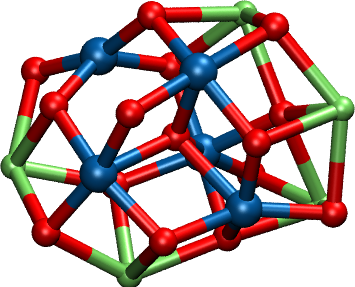3.6. Example: (CaTiO3)5
Tip
The sample input and output files can be found in testfiles/atom/4-catio35.
The system here is a cluster related to perovskite: \(\left(\mathrm{Ca}\mathrm{Ti}\mathrm{O}_3\right)_5\). We will use the Coulomb-Morse-Repulsion potential to model its interactions. The parameters can be found in misc/atomic-force-field.txt:
misc/atomic-force-field.txt
Metal-Metal 0.00 0.00 0.00 22.0 # J. Phys. Chem. B 2006, 110, 11780
O (-1.2)-O(-1.2) 0.042395 1.379316 3.618701 22.0 # J. Phys. Chem. B 2006, 110, 11780
...
Ca(+1.2)-O(-1.2) 0.030211 2.241334 2.923245 5.0 # J. Phys. Chem. B 2006, 110, 11780
Sr(+1.2)-O(-1.2) 0.019623 1.886000 3.328330 3.0 # J. Phys. Chem. B 2006, 110, 11780
Ba(+1.2)-O(-1.2) 0.065011 1.547596 3.393410 5.0 # J. Phys. Chem. B 2006, 110, 11780
Sc(+1.8)-O(-1.2) 0.000333 3.144445 3.200000 2.6 # J. Phys. Chem. B 2006, 110, 11780
Ti(+2.4)-O(-1.2) 0.024235 2.254703 2.708943 1.0 # J. Phys. Chem. B 2006, 110, 11780
Zr(+2.4)-O(-1.2) 0.206237 2.479675 2.436997 1.0 # J. Phys. Chem. B 2006, 110, 11780
Step 1: call abcinp to generate input files:
$ abcinp catio3 3 CoulombMorseRepulsion 10 100 1000 5 10 5 Ca 5 Ti 15 O
Parameters for atom 0: q > +1.2
Parameters for atom 1: q > +2.4
Parameters for atom 2: q > -1.2
Parameters for atom-pair 0-0: D alpha rho C > 0 0 0 22.0
Parameters for atom-pair 0-1: D alpha rho C > 0 0 0 22.0
Parameters for atom-pair 0-2: D alpha rho C > 0.030211 2.241334 2.923245 5.0
Parameters for atom-pair 1-1: D alpha rho C > 0 0 0 22.0
Parameters for atom-pair 1-2: D alpha rho C > 0.024235 2.254703 2.708943 1.0
Parameters for atom-pair 2-2: D alpha rho C > 0.042395 1.379316 3.618701 22.0
Step 2: Run the global optimization:
$ atom catio3.inp > catio3.out
After a few seconds, you will find the global minimum in catio3.xyz (see below) and local minima in catio3-LM.
